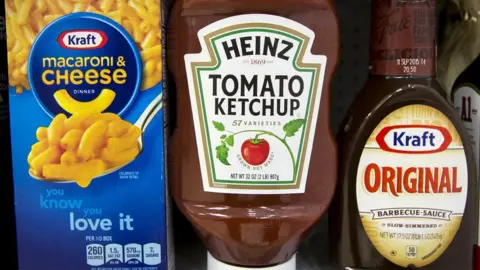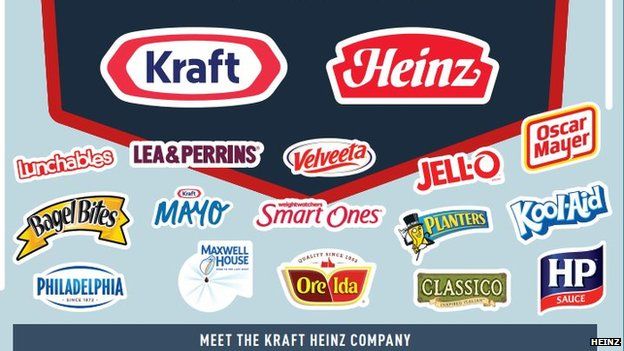Kraft Heinz shares fall as appetites wane
 Reuters
ReutersKraft Heinz's share price has plunged to a record low amid signs that customer appetite for the company's processed foods is weakening.
The US food giant's stock dropped 27% after it reported flat 2018 sales and said it would write down the value of its Kraft and Oscar Mayer brands by $15.4bn (£11.8bn).
The firm also said its accounting practices were under investigation.
But said it did not expect that inquiry to be "material" to financial results.
Kraft Heinz is one of the world's biggest food companies, with brands that include its eponymous ketchup, Jello-O, Amoy and Wattie's.
Created in 2015 by the merger of Kraft Foods and HJ Heinz, it is controlled by Berkshire Hathaway and the 3G Capital investment firm, which is known for its cost-cutting approach to its businesses.
At Kraft Heinz, that strategy has delivered mixed results.
The firm reported a $10.2bn loss for 2018, driven by flat sales of $26.2bn and the write-down on the brands.
'Overly optimistic'
Kraft Heinz blamed the 2018 shortfall on higher manufacturing and logistics costs.
"We were overly optimistic on delivering savings that did not materialize by year-end." Kraft-Heinz chief executive Bernardo Hees said.
 Heinz
HeinzKraft Heinz said the write down reflected expectations of lower profits going forward.
Results were also affected by the decision to cut prices in the US in an effort to boost shopper demand.
Mr Hees said he was encouraged by revived appetite for brands such as Philadelphia creamed cheese. The firm also plans to increase prices this spring.
But executives warned that profit growth would not return until 2020, as the firm's results are hit by a weaker first quarter, currency fluctuations and sales of parts of its businesses.
Increased competition
Kraft Heinz, like others in the industry, is facing increased competition from less expensive, retailer brands, as well as growing consumer preference for non-processed food.
"Our industry has been and is likely to remain challenged," Mr Hees said.
The firm's shares, which have been sliding for about two years, fell below $35 Friday.
The struggles also affected shares in rival food makers including General Mills, Conagra Brands, Unilever and Nestle SA.
Kraft Heinz also recorded $25m in extra costs in the fourth quarter following an internal review triggered by an inquiry by the US Securities and Exchange Commission into accounting practices within its procurement division.
"The company continues to cooperate fully with the US Securities and Exchange Commission," it said.
"At this time, the company does not expect the matters subject to the investigation to be material to its current period or any prior period financial statements."
